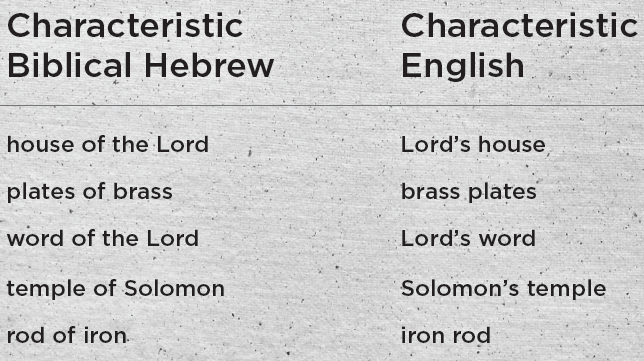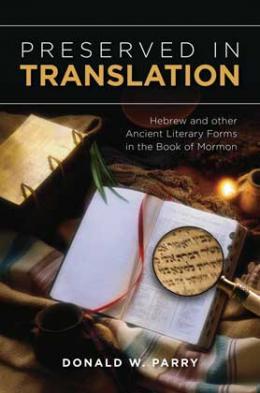Noun Phrases Using "Of"
Donald W. Perry, “Noun Phrases Using Of,” in Preserved in Translation: Hebrew and Other Ancient Literary Forms in the Book of Mormon (Provo, UT: Religious Studies Center, Brigham Young University; Salt Lake City: Deseret Book), 109‒110.
"plates of brass" (1 Nephi 3:24)
Biblical Hebrew attests a grammatical form called the “construct state,” where two or more nouns are juxtaposed to form what is called a construct chain.[1] Regarding this form, Stephen D. Ricks has written, “The ‘construct state’ in Hebrew indicates possession or relationship of one noun to another. This relationship is conveyed in English by the possessive case, by use of the preposition of, or by an adjective modifying a noun.”[2]

When this Hebrew form is translated into English, the term of is often added to show the relationship between the nouns. Thus in Biblical Hebrew we read “the house of the Lord” (1 Kings 8:10), “tables of stone” (Exodus 24:12), and “the word of the Lord” (Genesis 15:4). But in English we would instead say “the Lord’s house,” “stone tables,” and “the Lord’s word,” unless, of course, we are deliberately imitating the scriptural forms.
The Old Testament gives us thousands of examples of the construct state. There are also thousands of examples of the construct state in the Book of Mormon. These include such phrases as “plates of brass” (1 Nephi 3:24), “rod of iron” (1 Nephi 8:19), “sword of Laban” (2 Nephi 5:14), “temple of Solomon” (2 Nephi 5:16), “the commandments of the Lord” (2 Nephi 5:19), “land of promise” (1 Nephi 17:33), “works of darkness” (2 Nephi 25:2), and “plans of awful wickedness” (Helaman 6:30).
According to Thomas Brookbank, a pioneer in finding Hebraisms in the Book of Mormon, the term Lord’s is found “but twice in the entire Book of Mormon, while the equivalent of the construct state of nouns using his name occurs about three hundred times in a possessive sense in expressions such as ‘commandments of the Lord,’ ‘name of the Lord,’ ‘people of the Lord,’ ‘presence of the Lord,’ ‘promises of the Lord.’”[3] Similarly, the term God’s is found twice in the Book of Mormon, while the construct forms “church of God,” “commandments of God,” “kingdom of God,” “Spirit of God,” and so on are found more than 450 times.[4] This practice of preferring the construct state over the possessive and related forms to such a significant degree is a strong indication of Hebraic writing.
Notes
[1] For a grammatical treatment of the construct chain, see Waltke and O’Connor, Biblical Hebrew Syntax, 138–60; Williams, Hebrew Syntax, 7–10; Ewald, Syntax of the Hebrew Language, 77–102; Davidson, Introductory Hebrew Grammar, 58–63; and Lambdin, Introduction to Biblical Hebrew, 67–70.
[2] Ricks, “Converging Paths,” 399.
[3] Brookbank, “Hebrew Idioms and Analogies in the Book of Mormon,” 1062.
[4] Brookbank, “Hebrew Idioms and Analogies in the Book of Mormon,” 1062.
